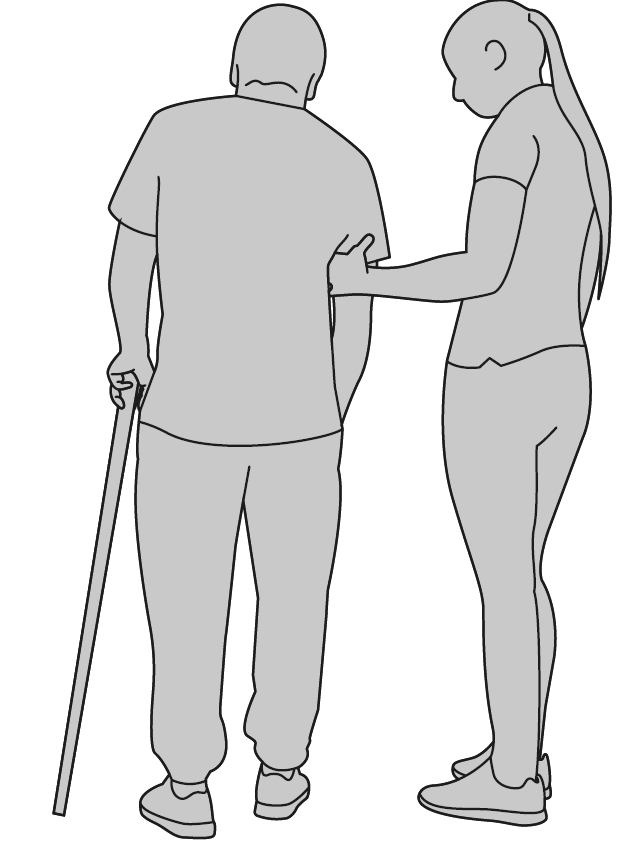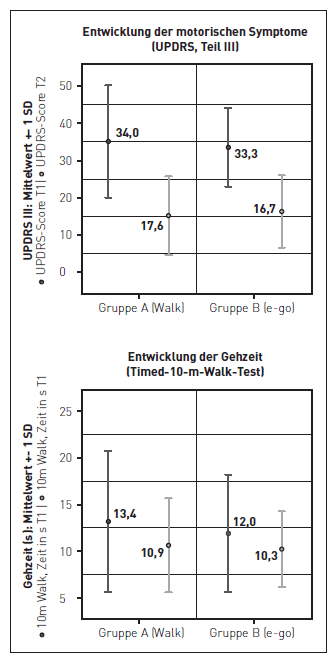
THERAPY-Magazin
Assistive gait training for advanced Parkinson’s syndrome
A new study shows that the THERA-Trainer e-go is a safe and effective tool for improving gait, balance, and quality of life in patients with advanced Parkinson’s. Results suggest benefits over conventional therapy, especially in later disease stages.

Redaktion
THERAPY Magazin
Investigation of the efficiency of specialised gait training using the THERA-Trainer e-go compared to conventional training methods to improve mobility and quality of life in patients with advanced Parkinson’s syndrome
Background and purpose
Idiopathic Parkinson’s syndrome (IPS) leads in the course of the chronic progressive disease to various restrictions on mobility, in addition to numerous non-motor symptoms. These are often associated with reduced independence in everyday life and reduced quality of life. Impairments in postural control and in the complex system of walking ability are insufficiently responsive to drug treatment. The use of complementary therapies is thus increasingly becoming part of neurorehabilitation and its research areas. Results from previous studies of patients with IPS suggest that activating therapies, such as treadmill training and the use of gait robots, have a positive effect on general motor skills, walking ability, balance and quality of life, especially in patients with pharmaco-refractory symptoms. However, to date it has not been possible to identify a therapy that is superior to the other methods.
The main objective of this study was to investigate the efficiency and rehabilitative potential of gait training with the newly-developed “THERA-Trainer e-go” in patients with IPS in the moderate to advanced stage of disease and to compare this with conventional gait training of equal therapy frequency and intensity relative to the general motor skills, gait characteristics and static and dynamic balance.
Idiopathic Parkinson’s syndrome (IPS) leads in the course of the chronic progressive disease to various restrictions on mobility, in addition to numerous non-motor symptoms. These are often associated with reduced independence in everyday life and reduced quality of life. Impairments in postural control and in the complex system of walking ability are insufficiently responsive to drug treatment. The use of complementary therapies is thus increasingly becoming part of neurorehabilitation and its research areas. Results from previous studies of patients with IPS suggest that activating therapies, such as treadmill training and the use of gait robots, have a positive effect on general motor skills, walking ability, balance and quality of life, especially in patients with pharmaco-refractory symptoms. However, to date it has not been possible to identify a therapy that is superior to the other methods.
The main objective of this study was to investigate the efficiency and rehabilitative potential of gait training with the newly-developed “THERA-Trainer e-go” in patients with IPS in the moderate to advanced stage of disease and to compare this with conventional gait training of equal therapy frequency and intensity relative to the general motor skills, gait characteristics and static and dynamic balance.
Methodology
In this controlled trial, 66 patients with Idiopathic Parkinson’s Syndrome (IPS) stages 3 and 4 in accordance with Hoehn & Yahr were randomised for gait training with the “THERA-Trainer e-go” or for conventional gait training with a gait therapist. Through block randomisation, the patients in the intervention and control groups were equally distributed by age, gender and disease stage. There were no relevant differences between the groups in terms of dropouts, illnesses or acceptance of the respective treatment. All patients received five 30-minute sessions of individual therapy per week, over a three-week period.
Primary outcome variables were changes in the motor Unified Parkinson’s Disease Rating Scale (mot. UPDRS) and in the timed 10m walk test (10-MWT). Secondary outcome variables were changes in 10-MWT with 3m entry and exit distance, in the Parkinson’s Disease Questionnaire (PDQ-39, on disease-related quality of life), timed “Up & Go”, functional reach test, slalom course, modified Romberg’s test and tandem gait. Changes in care dependency in everyday life were evaluated using the Barthel index. All tests were taken before and after completion of the three-week gait training. The investigators were blinded in terms of the study-specific intervention.
In this controlled trial, 66 patients with Idiopathic Parkinson’s Syndrome (IPS) stages 3 and 4 in accordance with Hoehn & Yahr were randomised for gait training with the “THERA-Trainer e-go” or for conventional gait training with a gait therapist. Through block randomisation, the patients in the intervention and control groups were equally distributed by age, gender and disease stage. There were no relevant differences between the groups in terms of dropouts, illnesses or acceptance of the respective treatment. All patients received five 30-minute sessions of individual therapy per week, over a three-week period.
Primary outcome variables were changes in the motor Unified Parkinson’s Disease Rating Scale (mot. UPDRS) and in the timed 10m walk test (10-MWT). Secondary outcome variables were changes in 10-MWT with 3m entry and exit distance, in the Parkinson’s Disease Questionnaire (PDQ-39, on disease-related quality of life), timed “Up & Go”, functional reach test, slalom course, modified Romberg’s test and tandem gait. Changes in care dependency in everyday life were evaluated using the Barthel index. All tests were taken before and after completion of the three-week gait training. The investigators were blinded in terms of the study-specific intervention.
Results
A key finding of this study is that both gait training with the “THERA-Trainer e-go” and conventional gait training delivered statistically significant and clinically relevant improvements in the primary target variables, mot. UPDRS and walking pace in the 10-MWT. The differences between the groups were statistically insignificant and different with respect to the two main target variables (better improvement in 10-MWT from conventional gait training and a tendency to better improvement from training with “THERA-Trainer e-go” in mot. UPDRS and the sub-group “legs”).
With regard to the secondary target variables, in the 10-MWT with 3m entry and exit distance, in the modified Romberg’s test, in the functional reach test, in the tandem gait and in the PDQ-39, numerically and by percentage more patients improved following gait training using the “THERA-Trainer e-go” than following conventional gait training. The group difference was statistically significant at the level of tandem gait side-steps.
Particularly noteworthy is that patients in more advanced stages of the disease (Hoehn & Yahr stage 4) clearly benefited more from gait training with the “THERA-Trainer e-go” with regard to walking pace and balance, while patients in the moderate stage of the disease (Hoehn & Yahr stage 3) achieved greater progress in the same areas through conventional gait training.
A key finding of this study is that both gait training with the “THERA-Trainer e-go” and conventional gait training delivered statistically significant and clinically relevant improvements in the primary target variables, mot. UPDRS and walking pace in the 10-MWT. The differences between the groups were statistically insignificant and different with respect to the two main target variables (better improvement in 10-MWT from conventional gait training and a tendency to better improvement from training with “THERA-Trainer e-go” in mot. UPDRS and the sub-group “legs”).
With regard to the secondary target variables, in the 10-MWT with 3m entry and exit distance, in the modified Romberg’s test, in the functional reach test, in the tandem gait and in the PDQ-39, numerically and by percentage more patients improved following gait training using the “THERA-Trainer e-go” than following conventional gait training. The group difference was statistically significant at the level of tandem gait side-steps.
Particularly noteworthy is that patients in more advanced stages of the disease (Hoehn & Yahr stage 4) clearly benefited more from gait training with the “THERA-Trainer e-go” with regard to walking pace and balance, while patients in the moderate stage of the disease (Hoehn & Yahr stage 3) achieved greater progress in the same areas through conventional gait training.
Conclusion
The results of this study show that the use of the “THERA-Trainer e-go” in the neurorehabilitation of patients with IPS is practical and safe and can enable an increase in mobility and quality of life even in the advanced stage of idiopathic Parkinson’s syndrome. The question of whether gait training with the “THERA-Trainer e-go” is superior to conventional gait training or treadmill training in patients in the advanced stage of IPS needs to be investigated in another controlled randomised study with a larger number of patients.
The results of this study show that the use of the “THERA-Trainer e-go” in the neurorehabilitation of patients with IPS is practical and safe and can enable an increase in mobility and quality of life even in the advanced stage of idiopathic Parkinson’s syndrome. The question of whether gait training with the “THERA-Trainer e-go” is superior to conventional gait training or treadmill training in patients in the advanced stage of IPS needs to be investigated in another controlled randomised study with a larger number of patients.

The results of this study show that use of the THERA-Trainer e-go in the neurorehabilitation of patients with IPS is practical and safe and can enable an increase in mobility and quality of life even in the advanced stage of idiopathic Parkinson’s syndrome.
Dissertation
Schmitt A: Vergleichende Studie zur Untersuchung der Effizienz eines spezialisierten Gangtrainings mittels THERA‑Trainer e-go gegenüber herkömmlichen Trainingsmethoden zur Verbesserung von Mobilität und Lebensqualität bei Patienten mit fortgeschrittenem Parkinsonsyndrom [Comparative study to investigate the efficiency of specialised gait training using the THERA-Trainer e-go compared to conventional training methods to improve mobility and quality of life in patients with advanced Parkinson’s syndrome]. Faculty of Medicine, University of Ulm, 2015 (Diss.).
Schmitt A: Vergleichende Studie zur Untersuchung der Effizienz eines spezialisierten Gangtrainings mittels THERA‑Trainer e-go gegenüber herkömmlichen Trainingsmethoden zur Verbesserung von Mobilität und Lebensqualität bei Patienten mit fortgeschrittenem Parkinsonsyndrom [Comparative study to investigate the efficiency of specialised gait training using the THERA-Trainer e-go compared to conventional training methods to improve mobility and quality of life in patients with advanced Parkinson’s syndrome]. Faculty of Medicine, University of Ulm, 2015 (Diss.).
2019-1
Audience
Gait
Inpatient Rehabilitation
Knowledge
Outpatient Rehabilitation
Products
Science
Section
THERAPY Magazine
Volume-Issue

Redaktion
THERAPY Magazin
References:
- m&i-Klinikgruppe Enzensberg: Forschungsbericht 2017, Berichtszeitraum 2014 - 2016, S. 54 - 56.
Related contents
Find related exciting contents in our media library.
Mehr laden
This is not what you are searching for? Knowledge
Meet our specialists.
Are you interested in our solutions? Schedule a meeting with a Consultant to talk through your strategy and understand how TEHRA-Trainer can help you to advance rehabilitation.